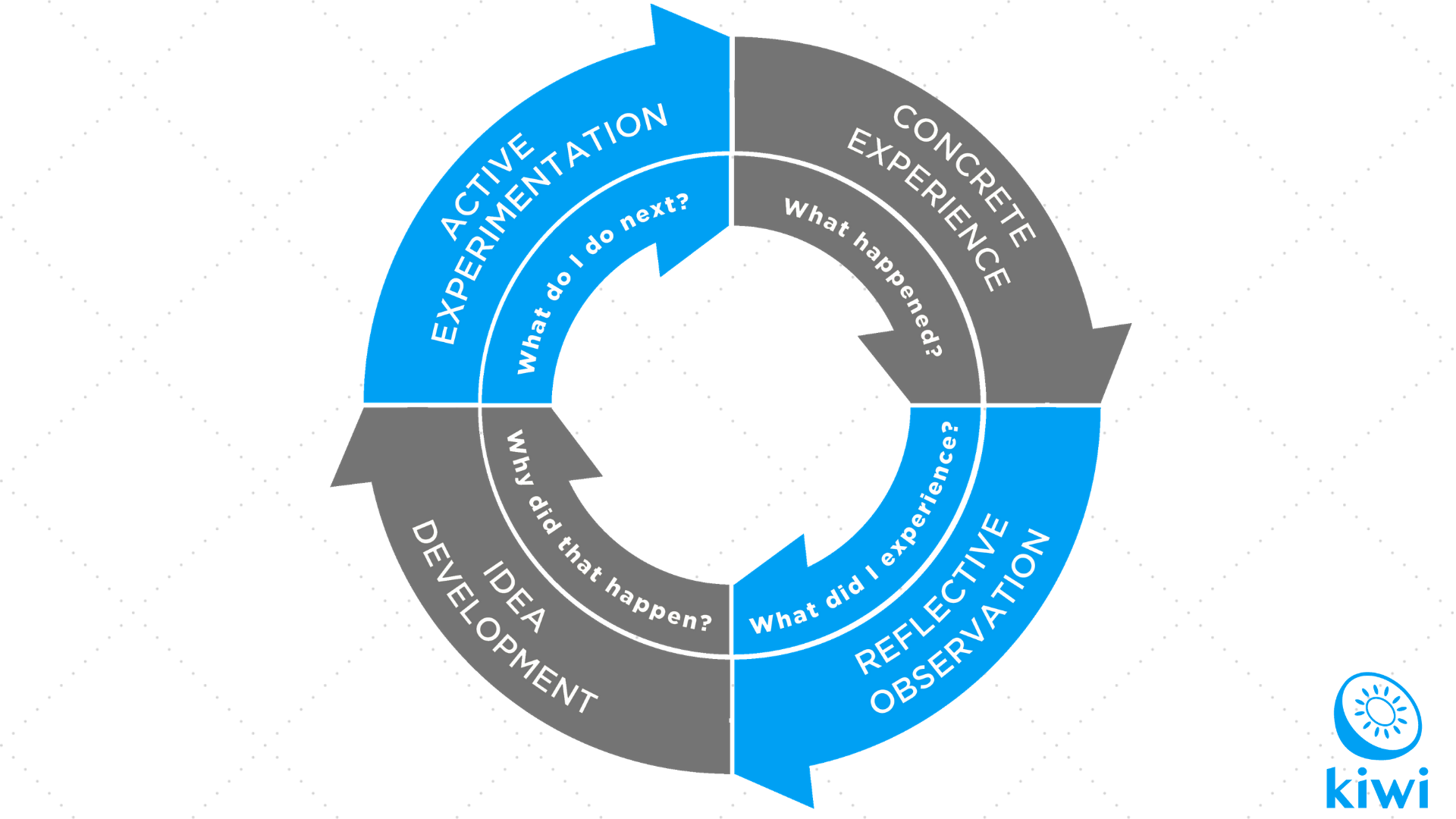22 May

Experiential learning is one of the first learning methods people have acknowledged. It is the way people before us have learned to do everything. Experiential learning means learning by doing and is the basis for team building and employee training method. It basically means that the individuals attain a certain skill and learns to something by doing it directly rather than reading about it.
Experiential learning is something that happens in our day-to-day life spontaneously. It actually starts when we are little kids and are trying to learn how to walk. When little kids are trying to learn how to walk they get up holding onto something. After that, they take their first steps by gently letting go. They are bound to fall the first time they try that, as they have no proper idea what exactly they are doing. The second time they get up, they know the territory and what breaks their balance. This time they know what to look for.
The importance of experiential learning
Experiential learning is a methodology that employers still use to train their employees. That’s because it has proven to help them in many different aspects of the learning process. Experiential learning is very important because it makes learning relatable, increases the effectiveness of learning, links theory to practice, increases students’ engagement, assists in memory retention, etc. Statistics show that experiential learning’s retention rate is 90% It is also a great way to build soft skills in the workplace.
A great example of experiential learning is medicine. Even though medical students go through years of learning and testing, memorizing every artery and muscle in the human body they still can’t go on to practicing their profession as attending doctors. First, they have to go through a one-year internship which can then turn into a residency which leads to a fellowship. This allows them to see and do in practice, everything they have learned about in med school. This is the perfect example of experiential learning.
Kolb’s experiential learning theory
 David Kolb is an American educational theorist. One of his most famous publications is the theory of experiential learning. According to Kolb, the experiential method works in two levels with a four-stage learning cycle and four learning styles. The learning cycle is explained on the basis of two dimensions, how the person understands and processes information. The learning process moves onto the stages as the individual continues to learn. Kolb states that the individual can enter the cycle at any given level.
David Kolb is an American educational theorist. One of his most famous publications is the theory of experiential learning. According to Kolb, the experiential method works in two levels with a four-stage learning cycle and four learning styles. The learning cycle is explained on the basis of two dimensions, how the person understands and processes information. The learning process moves onto the stages as the individual continues to learn. Kolb states that the individual can enter the cycle at any given level.
The stages include:
- concrete experience (CE),
- reflective observation (RO),
- abstract conceptualization (AC),
- active experimentation (AE).
Kolb’s learning styles

According to Kolb, there are four learning styles. The four are combinations of two of the stages.
- Diverging (CE/RO)
- Assimilating (AC/RO)
- Converging (AC/AE)
- Accommodating (CE/AE)
Individuals of the diverging learning style learn best by watching. They are people of great imagination and look at things from a different perspective. These people usually exceed in arts, love to work in groups, and take an interest in learning about new cultures and people. Their learning characteristics are concrete experience and reflective observation.
The assimilating learning style people prefer good and clear information. They enjoy dealing with concepts and abstract ideas and are quite logic at them. Their learning characteristics are abstract conceptualization and reflective observation.
Converging learning style people are very practical. They enjoy technical tasks where they can experiment with their ideas and apply their learning to practical issues. Their learning characteristics are abstract conceptualization and active experimentation.
Individuals of the accommodating learning style prefer to solve their problems intuitively rather than logically. They enjoy taking practical and experiential approaches. People with this learning style rely on others for information which they proceed to analyze themselves. Their learning characteristics are concrete experience and active experimentation.
The benefits of experiential learning
Experiential learning has many advantages, from the immediate application of knowledge to getting feedback instantly to the development of reflective practice habits. All of these advantages help the learner and the trainer have a more effective experience. The learner and the trainer both benefit from experiential learning in different ways.
Connects theory and practice
Experiential learning bridges the gap between theory and practice. Considering traditional school learning styles, students and people in general struggle to understand concepts practically and are left with partial knowledge in issues they should know well. This is why the experiential methodology is so popular and so important in erasing this gap and equipping individuals with clear ideas and concepts.
Increases Engagement
Experiential learning has also the advantage of increasing engagement in learners. Considering that the individual is involved in the problem-solving activity, they get to take part in the issue which results in higher engagement.
Provides Accurate Assessment Results
Assessing the results of the training program is a crucial element in training design. Experiential learning is a highly effective way of doing so, considering the fact that the results of the work done by the trainee reflect the knowledge they have attained.
Delivers Exceptional Return on Investment
Experiential learning influences feelings and emotions of the learner. That way, it is highly effective in its goal and at the same time ensures there is a high return on investment. It is far more successful in delivering exceptional ROI than traditional learning methods.
Types of Experiential Learning
Today, exceptional learning is presented to us in many forms. It can occur in day to day life, in the classroom, or in the workplace. Some experiential learning types are:
- Internships
- Externships
- Service Learning
- Student Teaching
- Undergraduate Research
- Volunteering
- Apprenticeships
- Fellowships
Why experiential learning is the future
Considering the popularity, importance, and benefits of experiential learning many would say that it is the future. More and more universities, businesses, and other institutions are using it to teach their learners in a more efficient and practical was. And although it might seem like a new concept, it truly is not. Seeing the success of the experiential learning methodology many companies have started to adapt it to their training programs. Since, as humans, we rely on experience to navigate through problem-solving, experiential learning really seems like the future.
Most popular posts
-
 Online Learning vs Face t...
141.8k views | posted on April 5, 2019
Online Learning vs Face t...
141.8k views | posted on April 5, 2019
-
 Top 10 Types of Employee...
118.2k views | posted on May 26, 2019
Top 10 Types of Employee...
118.2k views | posted on May 26, 2019
-
 10 Must-Have Skills and Q...
43.1k views | posted on July 8, 2019
10 Must-Have Skills and Q...
43.1k views | posted on July 8, 2019
-
 Induction Training – How...
24.1k views | posted on July 1, 2019
Induction Training – How...
24.1k views | posted on July 1, 2019
-
 9 Most Effective Training...
21.2k views | posted on July 15, 2019
9 Most Effective Training...
21.2k views | posted on July 15, 2019
Follow us